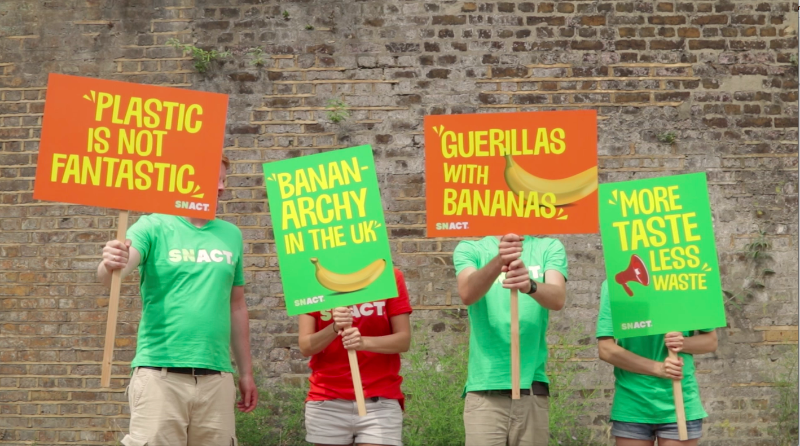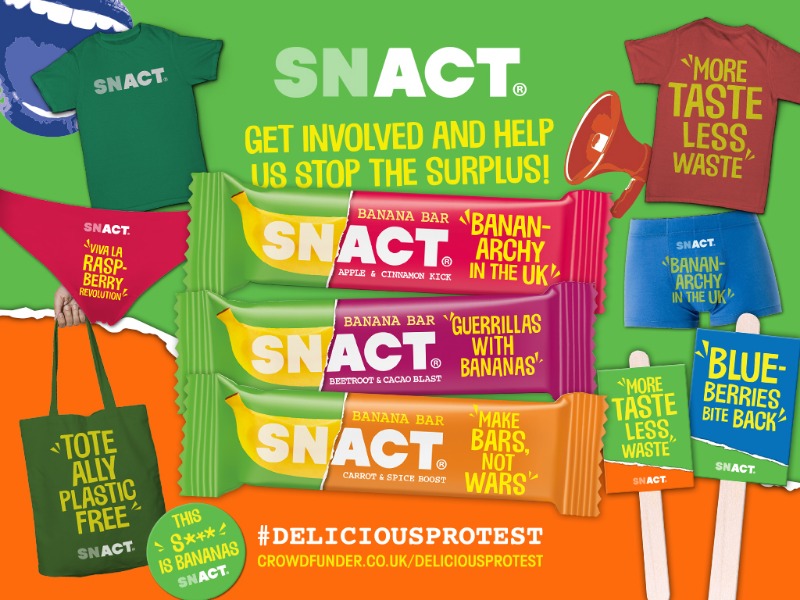This week for our first installation of ‘Founder Focus‘, we’ll be chatting with Ilana Taub – co-founder of sustainable snack brand ‘Snact’. Ilana founded the company in 2013 alongside partner Michael and have since developed a range of food waste-fighting healthy snacks.
We caught up with Ilana and asked her a few questions about Snact and her advice for startups in a similar position.

Tell us about Snact, where did the idea come from, and in particular your decision to only use surplus food? Michael (Snact’s other co-founder) and I both have environmental backgrounds and are passionate about food and sustainability. A few years ago, when we were brainstorming on business ideas together, we saw that food waste was a big issue (amongst many) in the food system and we decided we wanted to do something about it!
What have been the challenges of using surplus food, over standard food ingredients? If you use standard ingredients, you’re likely to have fewer suppliers & more constant suppliers – with surplus, there is a degree of uncertainty and more logistical challenges. It’s not that everything is under a sense of urgency but it does happen. We got a call asking if we could rescue 22 tonnes of bananas and had to figure out how to process them in a few days (before they would ripen too much). There’s also the misconception that if we use surplus, our products should be cheaper but actually processing surplus in the UK (not a low labour country) is more expensive than buying standard ingredients from elsewhere.
We know you spent a long time developing the Snact compostable wrapper which is a first of its kind – what were the main production challenges you faced? I can’t take any credit for developing the packaging! We didn’t develop it ourselves, we partnered with Tipa and Parkside Flexibles for this but it did take a while to get it just right! Packers are used to one kind of material and the compostable material, whilst being very close to traditional plastic, behaved slightly different on the packing line. That means we had a lot of delay in launching our bars & a lot of trial and error before getting it right!

Alternative Materials
Alternative materials and new production methods add a substantial cost over traditional manufacturing and thus affect end RRP – do you think consumers now understand and are willing to pay a premium for a more ethical product? Yes and no. I definitely think there are some consumers who are willing to pay a premium for a more ethical product but it’s still a very small minority. Ultimately, I think the majority of consumers will always look at taste/product attributes and price before any ethical consideration, even if this is done completely unconsciously.
In particular to your category for snack foods and snack bars – what have been your barriers to entry? I think the main one is that there is so much competition, it’s hard to stand out and get noticed by buyers. They get bombarded by new products and brands all the time, it’s really a challenge to get noticed!
And likewise – with the retail market already so saturated and dominated by key players, how do you think new brands can catch the attention of the major retailers and buyers? I’m not sure I have a great answer of that! I guess one is to do things differently so not just sending a boring old email with “hello, I have a product to present to you” because buyers must get hundreds of those. You have to be creative in your approach. And then the main advice is probably to have a product proposition that genuinely stands out from the rest. For a buyer to pick your product means they are likely having to remove someone else – why are they going to do that, what is your product going to bring to their offering that they don’t currently have. If you’ve got a product with a genuinely amazing unique proposition that meets current consumer needs, they can’t say no!

Do you think smaller challenger brands will continue to gain market growth over the larger groups over the next few years? I hope so! It definitely seems like a growing number of consumers want to try new things, and are excited about new brands. They’re also increasingly dubious about larger groups when you see food scandal after another – like with horse meat or more recently vegan products that turned out not to be vegan and so on. Put those two things together and it does suggest there is a lot of room for small challenger brands to grab a bigger share of the market!
Education
We know you are heavily involved in educating and advocating for sustainable food development – how would you summarise the main issues which are currently facing our food system? That is a huge question! There are issues everywhere, in the supply chain, at the retail level, on the consumer level, environmental impacts, social impacts… The food system is extremely resource intensive and responsible for environmental destruction left right and centre. It’s quite complex when you get into it, but if people are interested – I would suggest looking up some documentaries and reading some books 🙂 One of the first ones I read ages ago is called “Stuffed and Starved” by Raj Patel, looking at how we can have a system whereby 1 billion people are malnourished and 1 billion people are overweight at the same time, I highly recommend it!
What changes do you think we can make as consumers to contribute to a more sustainable food system? People often answer this question by making direct recommendations like “eat less meat”, “use less plastic” – I’m sure people have heard all of those before, and I’m also not sure how impactful that is. My main advice or suggestion would be for people to get curious and to go educate themselves on where food comes from, or what certain issues in the food system are and how they can mitigate that. If everyone did that and made a few small changes based on their own research, I’m sure we’d see a big difference!
And finally – what advice would you give a startup / founder looking to launch a product into the F&B market? Brace yourself for a rollercoaster of a journey! And on a more practical level, make sure you really study and understand the category you’re launching a product into – is there really a need for your product, what gaps are you filling, why is a buyer going to choose your product over another and why are consumers going to pick your product off the shelf. But really drill into those questions before getting started!
Do you have a snack brand or packaging project in mind? Get in touch, or view some of our work with Snact.

















Leave a Reply